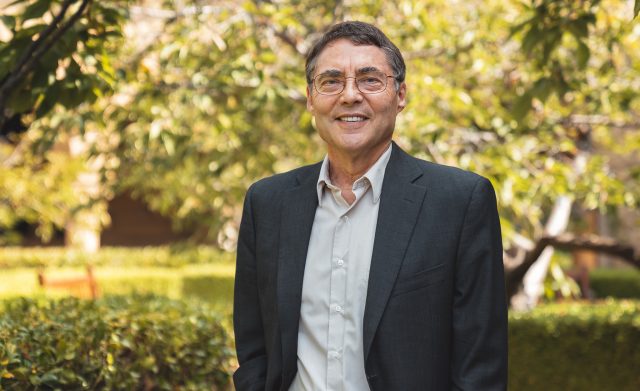
Stanford University professor and Nobel laureate Carl Wieman presents a virtual talk, titled ‘Taking a Scientific Approach to Teaching Science (and Most Other Subjects),’ to the UM community at 3 p.m. Oct. 21. Registration for the virtual talk is free. Photo courtesy Andrew Brodhead/Stanford University
OXFORD, Miss. – The University of Mississippi community is being offered an opportunity to hear from a Nobel Prize winner and acclaimed teaching and learning researcher.
The Center for Excellence in Teaching and Learning and the Academic Innovations Group are hosting a Zoom talk by Stanford University professor Carl Wieman from 3 to 4:30 p.m. Oct. 21. Registration is open until the day before the virtual talk, titled “Taking a Scientific Approach to Teaching Science (and Most Other Subjects).”
Wieman was awarded a Nobel Prize in 2001 for his work in the field of atomic physics and received the 2020 Yidan Prize for education research. He holds a joint appointment as a professor of physics and a professor in the Graduate School of Education, and is known for his innovative evaluation of the effectiveness of various teaching strategies used in education.
“Certainly the primary audience is people who teach at the university, but this is an event that we want to open up to anyone interested – students, staff, even alumni who might be interested,” said Josh Eyler, UM director of faculty development and lecturer of writing and rhetoric. “This is a rare opportunity to hear from a Nobel Prize winner.
“And it’s not just that he’s a Nobel Prize winner, but he’s talking about the heart of education and his decades’ worth of work on reforming higher education.”
Registration is available through a Google Forms site or the Center for Excellence in Teaching and Learning events website. Once registered, participants will be sent the Zoom link for the talk.
Wieman will discuss the science of learning and how people learn and what that means for teaching practices. He also will discuss teaching strategies and how teachers can effectively evaluate the teaching and learning that’s happening in their classrooms.
“Research on how people learn is now revealing much more effective ways to teach and evaluate learning than what is in use in the traditional science class,” Wieman said in his talk abstract. “Students and instructors find such teaching more rewarding, and it also shows students how to learn most effectively.
“This research is setting the stage for a new approach to teaching and learning that can provide the relevant and effective education for all students that is needed for the 21st century.”
Although he has a science background, the underlying principles in Wieman’s talk come from his research of higher education and apply widely.
“His whole mission, post-physics research and post-Nobel Prize, is to make education better,” Eyler said. “Now, as a scientist, he focused his initial efforts on science education.
“And his talk will have a lot about science education in it, but as he says in his title, the strategies that he’s talking about are applicable in almost any teaching situation that you’re given, so the talk will be more broadly applicable than for just science.”
Wieman, who also holds the DRC chair in the School of Engineering at Stanford, was named the 2004 U.S. Professor of the Year among all doctoral and research universities, a prestigious award sponsored by the Council for Advancement and Support of Education and the Carnegie Foundation for the Advancement of Teaching.
In 2017, Wieman published “Improving How Universities Teach Science: Lessons from the Science Education Initiative” (Harvard University Press). He wrote the book based on his experience as the founder and head of the Science Education Initiative at the University of Colorado, where Wieman was a professor before joining the Stanford faculty. The program focused on supporting faculty to approach the teaching of science as a science.
He also served in President Obama’s administration as associate director for science in the White House Office of Science and Technology Policy.
Wieman said in a 2020 Stanford University news release that he has “come to see education fundamentally as a way for people to learn to make better decisions,” and is advocating for “a scientific approach to teaching science” by urging STEM professors to apply the same principles in teaching that they use in their research.
For future Center for Excellence in Teaching and Learning events that address teaching and learning at UM and support the Ole Miss community, visit https://cetl.olemiss.edu/cetl-events-2/.